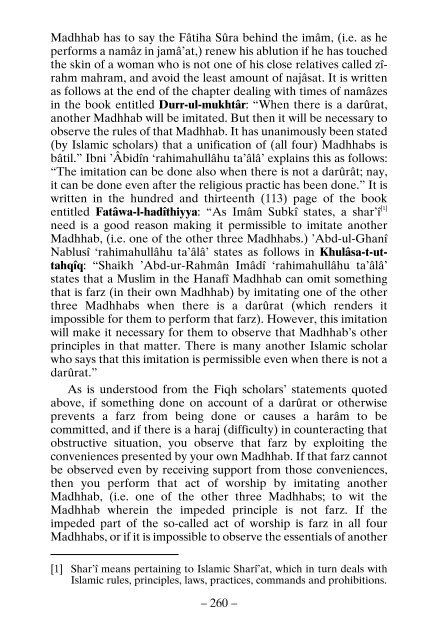O Son !
THE BOOK ‘O SON’ Al-hamdu lillâhi Rabbil ’âlamîn. Wa-s-salâtu wa-s-salâmu ’alâ Rasûlinâ Muhammadin wa Âlihi wa Sahbihi ajma’în. 1– O son! Collecting from books written by the scholars of the Hanafî Madhhab three hundred and sixty hadîth-i-sherîfs and forty-four khabars and also the seven essentials and the five rukns and the seven wâjibs and the fourteen sunnats and the twenty-five mustahabs and the fourteen mufsids of namâz, I have explained them for you. Adapt your acts and deeds to these teachings so that you attain fayz and nejât (salvation)! 2– Also for your information, I have collected a thousand and ninety âdâb (adabs) for you and for other young Muslims like you. If you adapt your actions and acts of worship to these teachings, they will be sufficient for you. If you laze, disobey Allâhu ta’âlâ and cease from these practices and manners, you will be afflicted with slavery and disgrace in the world and subjected to torment in the world to come. If you live up to them and advise your Muslim brothers to do the same, it will be useful for you. They will say blessings over you. And Haqq ta’âlâ will accept their invocations. For, a slave will be pardoned on account of another slave’s invocations for them.
THE BOOK ‘O SON’
Al-hamdu lillâhi Rabbil ’âlamîn. Wa-s-salâtu wa-s-salâmu ’alâ
Rasûlinâ Muhammadin wa Âlihi wa Sahbihi ajma’în.
1– O son! Collecting from books written by the scholars of the
Hanafî Madhhab three hundred and sixty hadîth-i-sherîfs and
forty-four khabars and also the seven essentials and the five rukns
and the seven wâjibs and the fourteen sunnats and the twenty-five
mustahabs and the fourteen mufsids of namâz, I have explained
them for you. Adapt your acts and deeds to these teachings so that
you attain fayz and nejât (salvation)!
2– Also for your information, I have collected a thousand and
ninety âdâb (adabs) for you and for other young Muslims like you.
If you adapt your actions and acts of worship to these teachings,
they will be sufficient for you. If you laze, disobey Allâhu ta’âlâ
and cease from these practices and manners, you will be afflicted
with slavery and disgrace in the world and subjected to torment in
the world to come.
If you live up to them and advise your Muslim brothers to do
the same, it will be useful for you. They will say blessings over you.
And Haqq ta’âlâ will accept their invocations. For, a slave will be
pardoned on account of another slave’s invocations for them.
Create successful ePaper yourself
Turn your PDF publications into a flip-book with our unique Google optimized e-Paper software.
Madhhab has to say the Fâtiha Sûra behind the imâm, (i.e. as he<br />
performs a namâz in jamâ’at,) renew his ablution if he has touched<br />
the skin of a woman who is not one of his close relatives called zîrahm<br />
mahram, and avoid the least amount of najâsat. It is written<br />
as follows at the end of the chapter dealing with times of namâzes<br />
in the book entitled Durr-ul-mukhtâr: “When there is a darûrat,<br />
another Madhhab will be imitated. But then it will be necessary to<br />
observe the rules of that Madhhab. It has unanimously been stated<br />
(by Islamic scholars) that a unification of (all four) Madhhabs is<br />
bâtil.” Ibni ’Âbidîn ‘rahimahullâhu ta’âlâ’ explains this as follows:<br />
“The imitation can be done also when there is not a darûrât; nay,<br />
it can be done even after the religious practic has been done.” It is<br />
written in the hundred and thirteenth (113) page of the book<br />
entitled Fatâwa-l-hadîthiyya: “As Imâm Subkî states, a shar’î [1]<br />
need is a good reason making it permissible to imitate another<br />
Madhhab, (i.e. one of the other three Madhhabs.) ’Abd-ul-Ghanî<br />
Nablusî ‘rahimahullâhu ta’âlâ’ states as follows in Khulâsa-t-uttahqîq:<br />
“Shaikh ’Abd-ur-Rahmân Imâdî ‘rahimahullâhu ta’âlâ’<br />
states that a Muslim in the Hanafî Madhhab can omit something<br />
that is farz (in their own Madhhab) by imitating one of the other<br />
three Madhhabs when there is a darûrat (which renders it<br />
impossible for them to perform that farz). However, this imitation<br />
will make it necessary for them to observe that Madhhab’s other<br />
principles in that matter. There is many another Islamic scholar<br />
who says that this imitation is permissible even when there is not a<br />
darûrat.”<br />
As is understood from the Fiqh scholars’ statements quoted<br />
above, if something done on account of a darûrat or otherwise<br />
prevents a farz from being done or causes a harâm to be<br />
committed, and if there is a haraj (difficulty) in counteracting that<br />
obstructive situation, you observe that farz by exploiting the<br />
conveniences presented by your own Madhhab. If that farz cannot<br />
be observed even by receiving support from those conveniences,<br />
then you perform that act of worship by imitating another<br />
Madhhab, (i.e. one of the other three Madhhabs; to wit the<br />
Madhhab wherein the impeded principle is not farz. If the<br />
impeded part of the so-called act of worship is farz in all four<br />
Madhhabs, or if it is impossible to observe the essentials of another<br />
[1] Shar’î means pertaining to Islamic Sharî’at, which in turn deals with<br />
Islamic rules, principles, laws, practices, commands and prohibitions.<br />
– 260 –

















